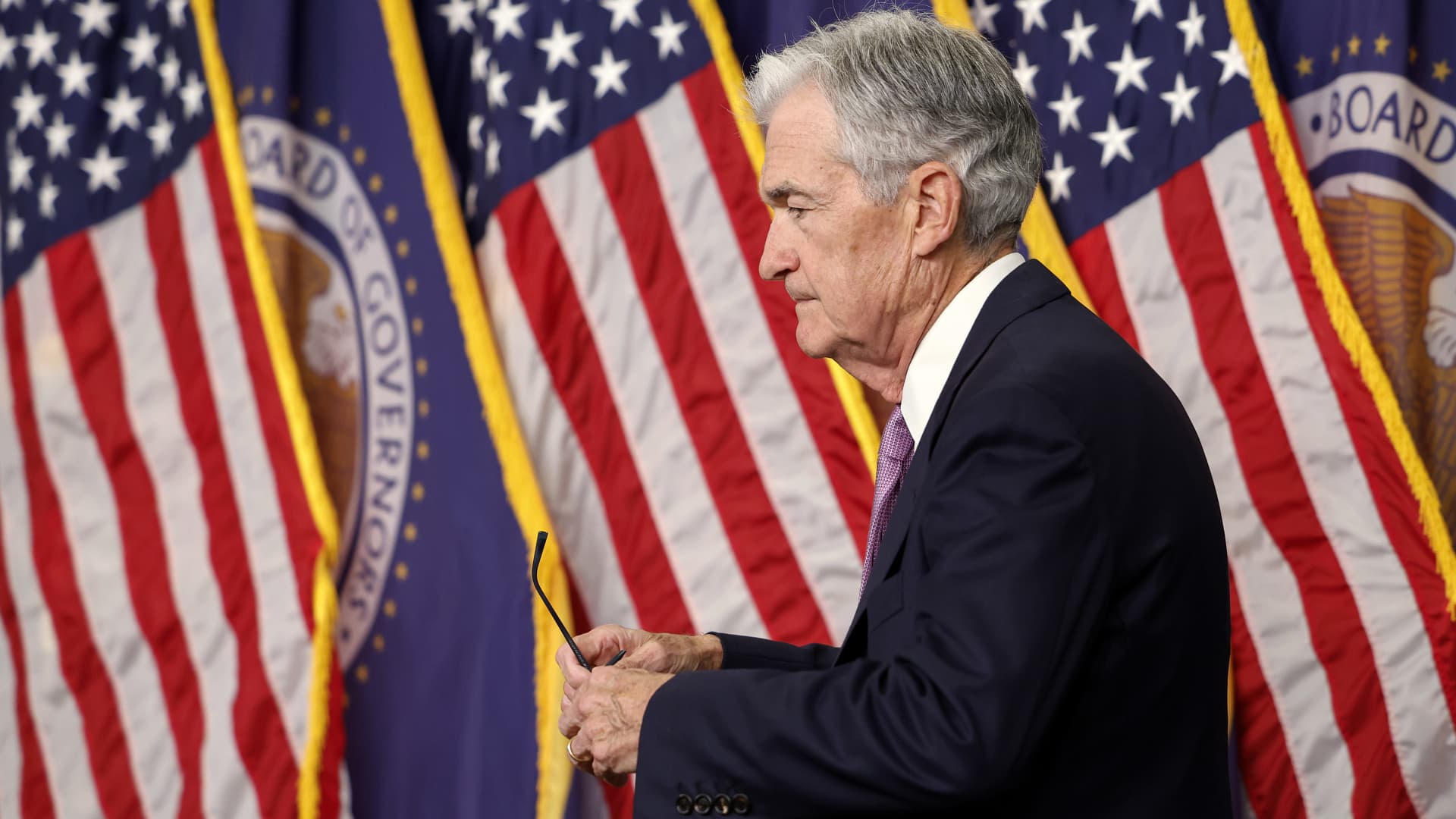Federal Reserve Chairman Jerome Powell arrives to a news conference following the September meeting of the Federal Open Market Committee at the William McChesney Martin Jr. Federal Reserve Board Building on September 18, 2024 in Washington, DC.
Anna Moneymaker | Getty Images
This week’s inflation data provided more evidence that the Federal Reserve is nearing its objective, fresh on the heels of the central bank’s dramatic interest rate cut just a few weeks ago.
Consumer and producer price indexes for September both came in around expectations, showing that inflation is drifting down to the central bank’s 2% target.
In fact, economists at Goldman Sachs think the Fed may already be there.
The Wall Street investment bank on Friday projected that the Commerce Department’s personal consumption expenditures price index for September will show a 12-month inflation rate of 2.04% when it is released later this month.
If Goldman is correct, that number would get rounded down to 2% and be right in line with the Fed’s long-held objective, a little over two years after inflation spiked to a 40-year high and unleashed an aggressive round of interest rate hikes. The Fed prefers the PCE as its inflation gauge though it uses a variety of inputs to make decisions.
“The overall trend over 12-, 18 months is clearly that inflation has come down a lot, and the job market has cooled to a level which is around where we think full employment is,” Chicago Fed President Austan Goolsbee said in a CNBC interview Thursday after the latest consumer price data was released. “We’d like to get both of them to stay in the space where they are right now.”
Some obstacles ahead
While keeping inflation at bay may not be an easy task, the latest data indicate that though prices are not receding from their troublesome heights of a few years ago, the rate at which they are increasing is pulling back.
The 12-month rate for the all-items consumer price index was at 2.4% in September, while the producer price index, a proxy for wholesale inflation and a leading gauge for pipeline pressures, showed an annual rate of 1.8%.
Goldman’s projection that the PCE index is heading to 2% is also about in line with tracking from the Cleveland Fed.
The central bank district’s “inflation nowcasting” dashboard pegs the 12-month headline PCE rate at 2.06% for September, which would get rounded up to 2.1%. However, on an annualized pace, inflation for the entire third quarter is running at just a 1.4% rate — well below the Fed’s 2% goal.
To be sure, there are some caveats to show that policymakers still have some work to do.
Core inflation, which excludes food and energy and is a metric that the Fed considers a better measure of longer-term trends, is expected to run at a 2.6% annual rate for the PCE in September, according to Goldman. Using just the consumer price index, core inflation was even worse in September, at 3.3%.
Fed officials, though, see the unexpectedly high shelter inflation numbers as a major driver of the core measure, which they figure will ease as a lower trend in rents works its way through the data.
Fed Chair Jerome Powell last week, addressing the rent situation, said he expects housing inflation to continue to recede while “broader economic conditions also set the table for further disinflation.”
From a policy standpoint, lower inflation opens the door for the Fed to keep cutting rates, particularly as it turns its attention to the labor market, though there’s some trepidation about how quickly it should move.
September’s half percentage point reduction to a fed funds range of 4.75% to 5% was unprecedented for an economy in expansion, and the Fed at the very least is expected to return to its normal quarter-point pace. Atlanta Fed President Raphael Bostic even said Thursday he’d be open to skipping a move altogether at the November meeting.
“Aggressive easing would risk spiking consumer demand just as it is settling into a sustainable pace,” PNC senior economist Kurt Rankin said in a post-PPI analysis. “This result would in turn put pressure on businesses to meet that demand, re-igniting gains in those businesses’ own costs as they jockey for the necessary resources to do so.”
Futures traders, meanwhile, are betting on a near-certainty that the Fed cuts rates by a quarter point at both the November and December meetings.

 Accounting1 week ago
Accounting1 week ago
 Personal Finance1 week ago
Personal Finance1 week ago
 Accounting1 week ago
Accounting1 week ago
 Finance1 week ago
Finance1 week ago
 Economics1 week ago
Economics1 week ago
 Economics1 week ago
Economics1 week ago
 Economics1 week ago
Economics1 week ago
 Personal Finance1 week ago
Personal Finance1 week ago





















